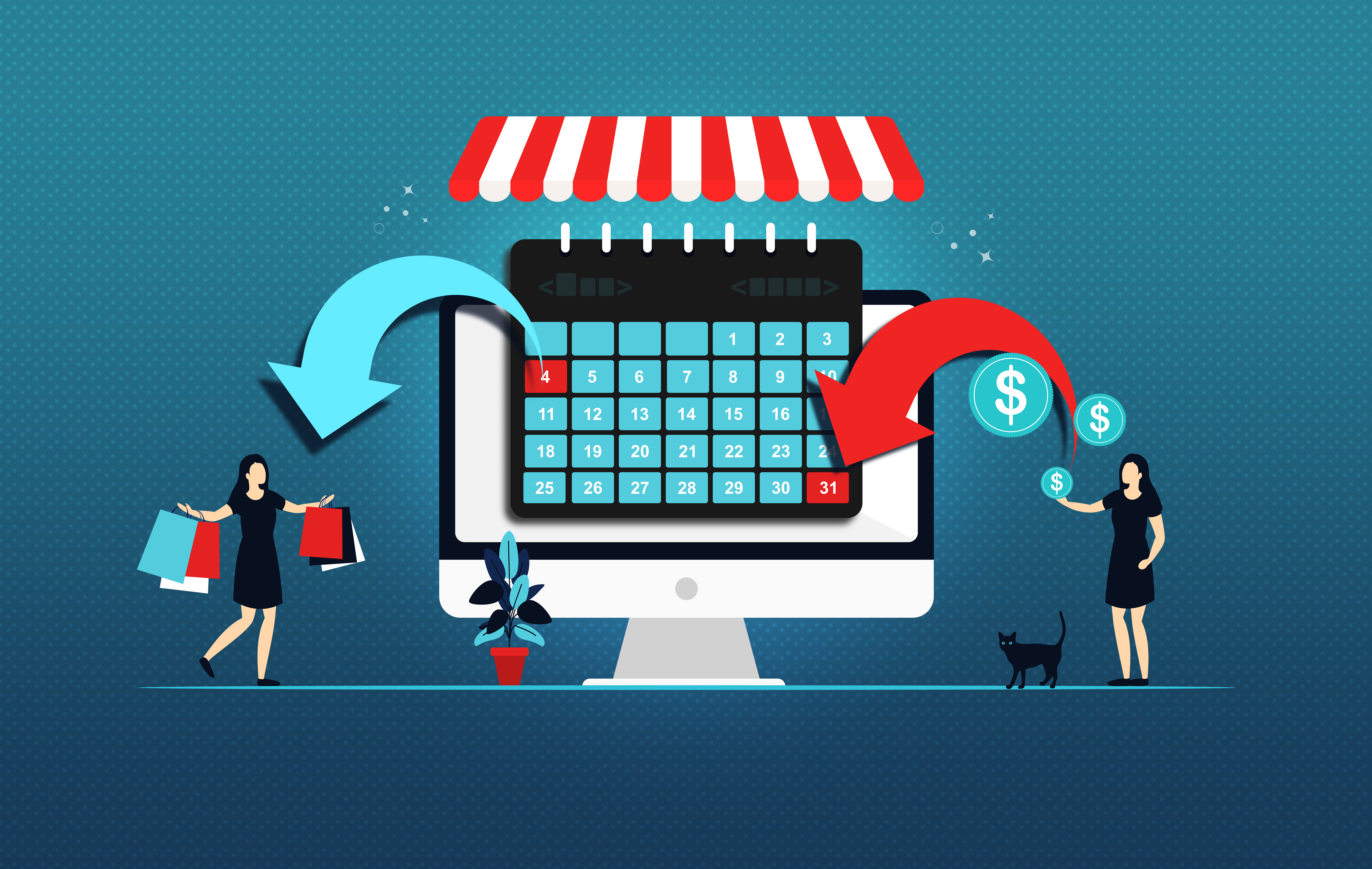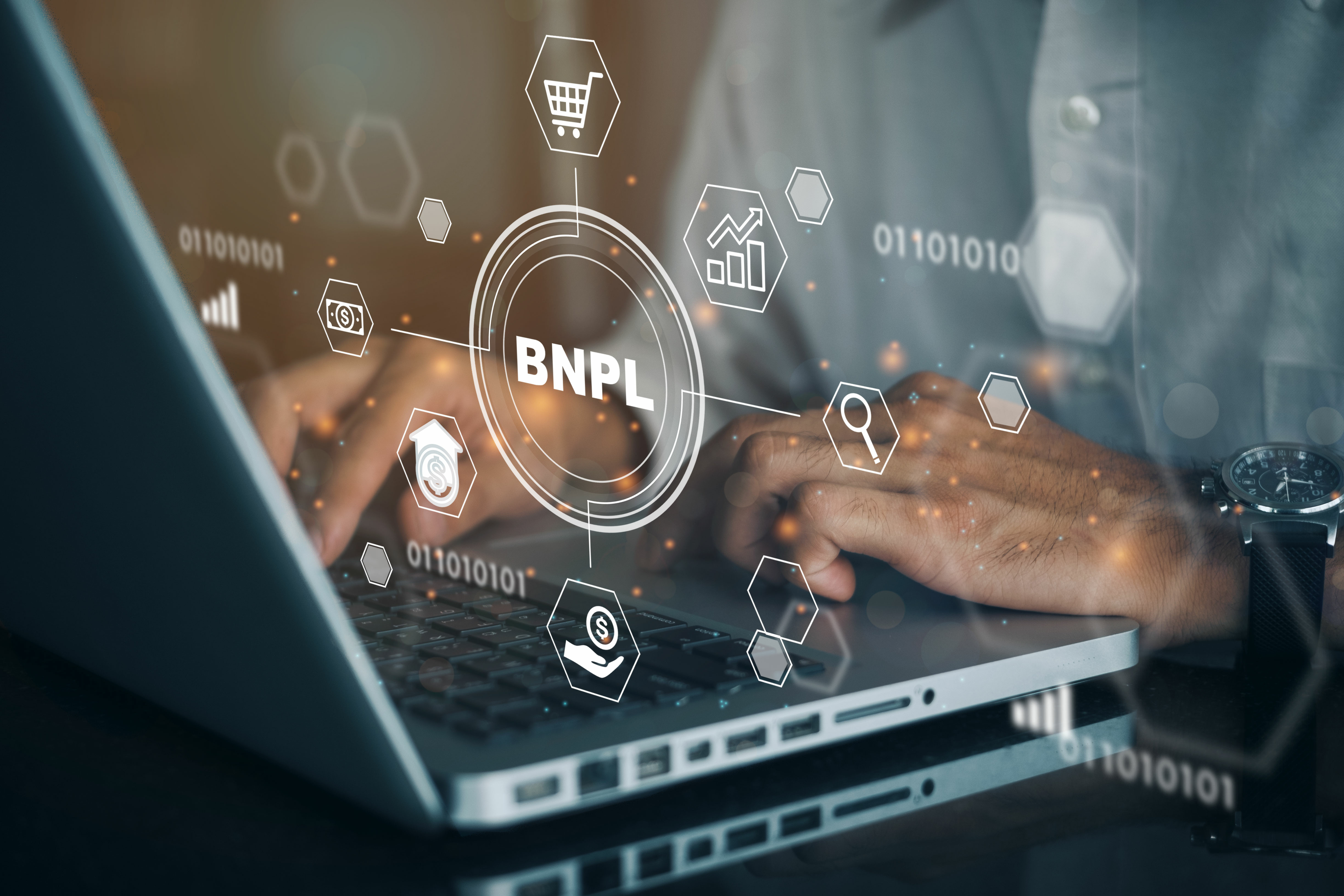Buy now, pay later
Buy Now Pay Later (BNPL) is becoming an increasingly popular payment method for customers shopping at their favorite eCommerce stores, allowing them to make purchases without the immediate financial burden. Through a third-party provider, customers can split their payments over a few weeks or months, making it easier to manage larger expenses. This model is especially convenient for customers who want to buy now and pay later without paying interest, as long as they stick to the agreed-upon payment schedule.
For businesses, BNPL can also be a game-changer, especially when purchasing essential but expensive equipment or inventory. Imagine needing a costly item to keep your operations running smoothly, but lacking the working capital to pay upfront. With BNPL, you can order the item online, pay a portion of the cost immediately (usually 25%), and then spread out the remaining payments over a few weeks or months—often without interest. For example, a $10,000 purchase might be split into four payments of $2,500, paid every two weeks, easing cash flow and allowing you to get what you need without waiting.
While BNPL is typically associated with personal shopping, it's increasingly being adopted in the business world. Business owners are realizing that BNPL is an excellent way to unlock working capital for crucial purchases, especially in industries where equipment and inventory costs can strain cash flow. BNPL offers an alternative to traditional business loans, providing quicker access to needed products and services while avoiding the burden of high-interest rates and lengthy approval processes typically associated with more formal financing methods. Plus, because it’s a third-party provider managing the transaction and payment collection, businesses don’t have to handle the intricacies of loan paperwork or deal with the risks of default on their own. This makes BNPL a flexible, hassle-free solution for businesses looking to streamline their purchasing process and maintain healthy cash flow.
What’s the buy now pay later advantage for retailers and businesses?
While buy now pay later has been around for quite some time, it’s grown in popularity over the last year because of its win-win nature for both the customer and the retailer. We already know that the customer can purchase expensive items, or simply purchase more, without paying in full, but what’s in it for the business?
First off, buy now pay later encourages customers to increase their average order value (AOV) beyond what they may have purchased otherwise, typically because of the cost upfront. Retailers and businesses generate more revenue using a buy now pay later service because customers become less hesitant when they see the cost of an item they are looking at.
When a business is presented with the BNPL option, it allows them to make the purchases they need without overextending their business financings. Making payments in installments (especially when they’re interest free) instead of a payment method like a business credit card or line of credit is very attractive. It keeps those options open for emergencies or other urgent needs while potentially protecting the business’ credit rating.
Some buy now, pay later services allow for customization of a payment plan. For any business needing to make a large equipment purchase, or a substantial supply order, this helps to plan and prepare for payments without sacrificing business growth opportunities.
And then there’s the ease of entering a BNPL services plan—for the customer and the business. Especially when the transactions are done online, choosing to use buy now pay later is often a matter of a few extra clicks of a button at payout. Coupled with the full payment provided the retailer by the buy now pay later provider, it’s a service that benefits both parties.

But not all B2B transactions are appropriate for an online buy now pay later option. It can suggest that the seller isn’t in a financial position to extend net terms, or (perhaps worse) imply that your customers can’t afford your products or services.
An alternative is based on the fintech solution of digital net terms. Using this service, businesses access discrete credit checks on their customers. This provides accurate and reliable information about whether to extend credit to a customer, what their credit limit should be, and what net terms to offer.
Resolve is one business offering this service, but it’s far more than just an alternative to buy now pay later. It’s a complete net terms and credit management solution. Businesses work with Resolve to extend net terms to their customers, offer payment options through a platform that’s branded with the business’ information, and give their customers real-time online access to their accounts, the amount of credit they’ve used, and their net terms.
One of the biggest advantages to a business that uses BNPL is getting paid by the third party provider while giving the customer time to pay. Resolve pays out up to 90% of each invoice within one day, giving businesses a professional and practical cash flow solution.
In addition, most government contracts require net terms rather than buy now pay later options. Using Resolve gives businesses access to these customers.
Ecommerce businesses benefit from adding BNPL options
For ecommerce businesses, this results in a decrease in cart abandonment rates as well. What their customers see is the cost of an expensive item broken up into small and affordable increments. This encourages them to think of the large purchase as a couple of small ones, which is more manageable when money is tight.
The seller will get paid in full right away by the third-party buy now pay later provider, so they’re bringing in more revenue. It’s especially valuable during times when customers need to increase inventory but won’t get paid by their customers upfront.
There are fees that come with using this service. Most providers charge between 2% and 8% of the purchase amount. Of course, the fees will vary depending on the business and the BNPL provider.
Despite the service fee, businesses are made more accessible to their customers by using a buy now pay later provider. In one review, 64% of customers said that they would use a buy now pay later purchase if the retailer offered interest-free repayment, and 56% of businesses using the service reported an increase in their average order value (AOV).
Using buy now pay later helps to keep your business competitive. If a competitor provides a buy now pay later service and your business does not, you will likely lose a transaction to your competitor. Keeping in mind, implementing it into your eCommerce store, will give you an advantage over your competitors who do not yet have it.
Offering a buy now pay later option will increase your business’ customer lifetime value, as well. Customers are more likely to come back and purchase through your business again if their shopping experience was easier and more beneficial than the competitor. This creates a sense of loyalty between your business and the customer. Ecommerce stores that are accessible to their customers by offering a buy now pay later option at checkout are more likely to build trust and show customers that their business values their time and money. Customers who feel valued in this way are likely to return, making the business’ customer lifetime values increase.
PayPal, Afterpay, Klarna, Affirm, Stripe and Apple Pay are all on board with BNPL
It’s clear that fintech businesses see a long future in the buy now pay later field. PayPal is probably the best-known great buy now pay later provider, offering a program known as pay-in-4. They offer shoppers 0% interest rates, no late fees, and easily accessible loan terms. Those terms highlight that there must be 4 payments due every 2 weeks, for a total of 6 weeks, with the first payment due at the time of purchase. The loan amount to use a buy now pay later service is at least $30, with a maximum loan of $1,500. Any retailer that is integrated with PayPal can use pay-in-4 in their eCommerce store.
The biggest separating factor between PayPal’s pay-in-4 when compared with other buy now pay later services is that PayPal does not charge late fees and they do not report to credit bureaus. Using PayPal’s pay-in-4 won’t affect the customer’s credit score at all, and they typically will not run a hard credit check on the customers that are using pay-in-4.
PayPal and other similar companies will run a soft credit check on customers occasionally if they use the provider frequently, but they tend to use diverse consumer data to regulate whether or not they will approve a particular customer.
This is a huge bonus for all customers regardless of credit history because it offers a way to purchase expensive machinery or inventory and pay it back over time without the risk of credit repercussions or restrictions.
BNPL allows small businesses to grow their reach
For small businesses and startups, any chance to expand reach, attract new customers, and increase sales are valuable. BNPL is one option that’s especially effective for GenZ and millennial customers. During the 2021 holiday season, customers from these demographics took advantage of buy now pay later options at checkout in much higher numbers—up to 20% of an increase in total sales from the prior year.
This shows that it’s resonating with customers. And it’s easy for small businesses to get started. After signing up with a third party provider (the most popular are PayPal, Afterpay, Affirm, and Zip), every customer is given the option for BNPL at checkout. This works both online and in-store, giving sales people a powerful tool to encourage higher sales.
One caution is to be aware of what the fees will be when your customer uses BNPL at checkout instead of cash or debit. Each provider has slightly different fees and policies. Check the fine print so you know the exact cost of offering this service to your customers.
Another consideration is consumer protection laws. Always work with an established buy now pay later provider that’s been in business long enough to establish credibility and ensure their policies are in full compliance with privacy and data laws.
And take some time to read the online reviews for each company you’re considering, as well as check out their BBB (Better Business Bureau) rating. The last thing you want is for a company to exploit your customer’s data for their own gain.
Once you’ve identified a credible company with reasonable fees, the benefits of BNPL may be just what your business needs to improve sales without impacting cash flow.







